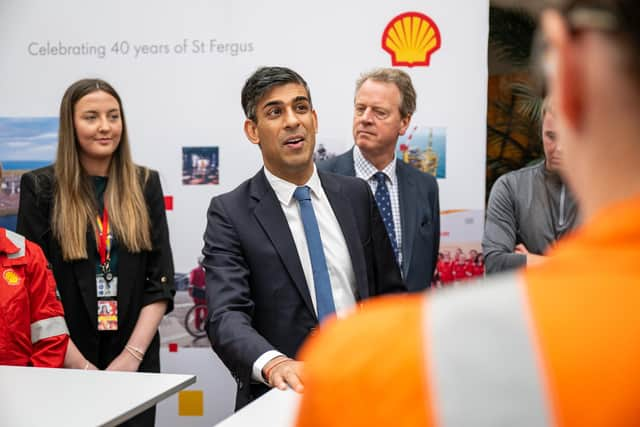Rishi Sunak backs two carbon capture projects with billions of pounds of funding
Prime Minister Rishi Sunak committed up to £20bn for early deployment of carbon capture, utilisation and storage (CCUS), for Harbour Energy’s Viking project in the Humber and the Acorn project in Scotland.
In a bid to reach net zero, the Government is aiming to ensure 20m to 30m tonnes of carbon dioxide is captured each year by 2030.
Advertisement
Hide AdAdvertisement
Hide AdHarbour Energy claims its scheme in the Humber could capture up to 10m tonnes a year by 2030 and it is able to store around 300m tonnes in the “depleted Viking gas fields”.


The company, which is also part of the joint venture running Acorn, said the front end engineering and design phase of both CCUS projects can now begin.
Linda Cook, chief executive of Harbour Energy, said: "Today's announcement is an important step forward for Harbour's Viking and Acorn CCUS projects and the development of the carbon capture and storage industry in the UK.
"It is also a further demonstration of the key role that the oil and gas sector is playing by using our existing infrastructure, skills and experience to build this new industry and help deliver the energy transition.
Advertisement
Hide AdAdvertisement
Hide Ad"Viking has the potential to be transformational for the Humber, the UK's most carbon intensive industrial region, creating thousands of jobs in the area and playing a vital role in supporting the UK to meet its target to capture 30m tonnes of CO2 annually by 2030."
Will Gardiner, Drax Group chief executive, said the announcement “represents a significant step toward helping the region meet its net zero ambitions”.
He added: “The announcement shows the importance of CCUS to the Humber and, along with the East Coast Cluster, creates an additional pathway to support our plans for bioenergy with carbon capture and storage at Drax Power Station.
“We are currently engaged in productive discussions with the UK Government on this project and hope to invest billions in its development and deploy this critical, carbon removals technology by 2030.”
Advertisement
Hide AdAdvertisement
Hide AdThe company, which is aiming to become carbon negative by 2030, emitted 669 kilotonnes of carbon dioxide equivalent (ktCO2e) by generating power in 2022.
It currently runs the country’s largest power station, Drax Power Station in Selby, which can provide enough power for around 5m homes by burning compressed wood pellets – known as biomass.
Drax was aiming to open a carbon capture facility in 2027, but announced it was pausing the project in March until the Government agreed to provide financial support.
Mr Sunak announced £20bn for the CCUS projects in Scotland, where he also said that more companies will be granted licences to extract oil and gas by the North Sea Transition Authority (NSTA).
Advertisement
Hide AdAdvertisement
Hide AdThe Prime Minister said it was “absolutely the right thing to do”, despite criticism from environmentals who claim the Government should be working to drastically reduce greenhouse gas emissions.
“Even when we reach net zero in 2050 a quarter of our energy needs will still come from oil and gas, and domestic gas production has about a quarter of a third of the carbon footprint of imported gas,” he told The BBC.